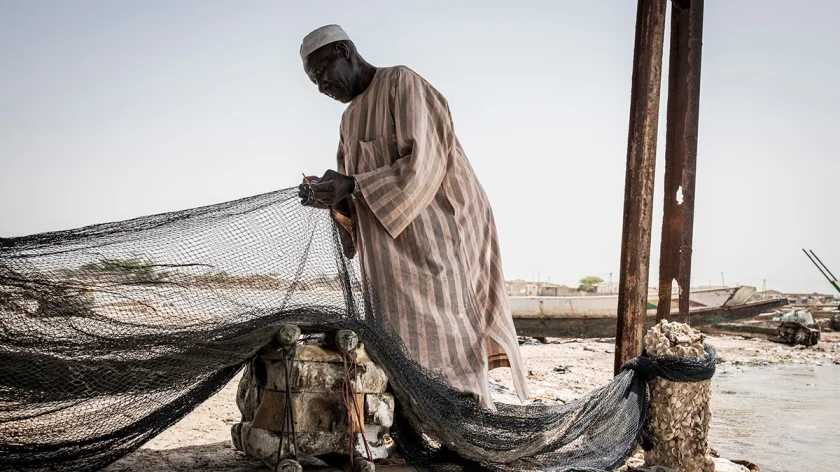There are no longer plenty of fish in the sea.
According to the Food and Agriculture Organization (FAO), more than 35 percent of the world’s assessed fish stocks are fished at unsustainable levels, versus just 10 percent in 1974. Warming oceans, acidification, and pollution are also taking an increasing toll.
And with the livelihoods of some 600 million people worldwide dependent on fishing to some degree, and growing demand for marine protein to feed a burgeoning global population, this isn’t just an environmental crisis, it is a social and economic one.
“We used to get up to 100 kilograms a day. Sometimes even more,” said La Ode Tauhid, an artisanal fisher in Indonesia’s Southeast Sulawesi Province. “But now it’s way lower than that, like 50, 40, or 30 kilos – or sometimes nothing at all.”
To solve this crisis, fishing must change.
Teaching a man – or woman – to fish may once have been enough to feed them for life. Now they must learn how to fish sustainably. Since 2017, the Global Environment Facility-funded Coastal Fisheries Initiative has been hard at work on three continents and on multiple tracks to do just that.
The ambitious program, now in its final year, was designed to give coastal communities in six target countries – Cabo Verde, Côte d’Ivoire, Ecuador, Indonesia, Peru, and Senegal – the knowledge and tools needed to make their fisheries more sustainable, while at the same time bolstering their resilience to economic shocks.
All hands on deck
The CFI is a truly international undertaking. Coordinated at the global level by the FAO, it is implemented by multiple global agencies including Conservation International, the UN Development Programme, the UN Environment Programme, the World Bank, and WWF, and draws on the on-the-ground knowledge and energy of scores of individuals and local organizations.
“To succeed in preserving and restoring ecosystems over the long term, we need to work with the communities that lie at the heart of all activity,” said CFI Global Coordinator Fatou Sock of the FAO. “You can’t restore habitats without the active participation of all the people involved.”
The CFI has three main areas of focus: policy, people, and partnerships.
On the policy front, teams have used workshops and consultations to help authorities shape legislation that supports small-scale fisheries through the transition to greener practices. Legal experts, meanwhile, have conducted painstaking assessments of existing laws to see whether they uphold three key principles that are central to the program.
The first of these is whether and how much they support women, who usually run the household while their husbands are fishing and often handle the processing and sale of the catch afterward.
Ideally, legislation should also support an Ecosystem Approach to Fisheries Management, which considers the entirety of an ecosystem – including the people who depend on it for food and income – rather than concentrating on ecological and environmental aspects only.
Finally, laws should dovetail with the FAO’s voluntary guidelines on creating sustainable small-scale fisheries. These guidelines, agreed in consultation with fishing communities around the world, are designed to safeguard stocks without impoverishing people, and to ensure that everyone, especially Indigenous Peoples, are given a say in their implementation.
Focus on sustainable fisheries
Coastal settlements are disproportionately affected by rising sea levels, biodiversity loss, and other pernicious effects of climate change. And many lack government safety nets to help them weather disasters or personal crises. The resulting combination of economic and food insecurity can make it hard to stick to catch quotas and other measures designed to protect marine environments.
Hence the CFI’s focus on helping fishing-dependent communities develop ways to strengthen their economic health.
With improved financial planning and alternative income streams, fishers can more easily adapt to changes such as the introduction of biological rest periods for fish or no-take areas without undue hardship.
This is why the CFI has championed financial literacy training and easy-to-implement systems along the lines of Peru’s UNICAs (Uniones de Crédito y Ahorro): local groups that pool money in interest-bearing funds. Loans from these funds can help members cope with illness or emergencies, pay for education, or start small businesses.
To help coastal communities learn the ins and outs of sustainable fishery management, best practices for fish preservation and handling, and entrepreneurship, teams from across the five child projects have run workshops and exchange trips with other communities.
Read the full article: GEF

